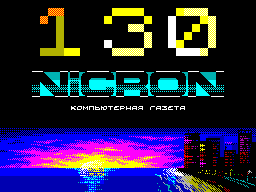|
Nicron #20
14 февраля 1997 |
|
Programming - a course of study assembler Wlodek Black, continued. Organization of memory.

z80
[Continued]
(C) WLODEK BLACK
Hello, friends! Ended with the main "course" of assembler
including a description of the CPU and the system's commands,
and ... showered with questions and requests. And it is
remarkable, because the presence of response confirms being
wanted rubric "assembler"; mean, you my friends find it useful
to himself; hence will continued. And then, why yes I am I?
Maybe someone from the experienced programmers also willing to
share fresh "secrets"? Then write or call. And users are - also
write! Your questions - our answers. And for today's busy you
are, my friends my chosen topic:
Organization of memory in your computer "Spectrum 128K.
With the proposal to consider this topic has received 4 bids.
(3 questions came on the device monoblock loader, when the
whole program outwardly looks like a BASIC file nemerenoe length
and data compression - how to shrink the digital DeMouy, for
example). About monozagruzchike talk in a week!
7
$ 6
4
-------- 3
65535 FFFF 1
RAM 16K 0 <- port # 7FFD
49152 C000 (bits 2 .. 0)
------- BFFF
RAM 16K 2
32768 8000
------- 7FFF
RAM 16K 5
16384 4000 $
------- 3FFF 0 <- port # 7FFD
ROM 16K 1 * (bit 4)
0 0000 *
-------
This diagram shows the distribution of address space
128K, or, equivalently, a map of 128-th machine. Computer
memory is divided into fragments with a volume of 16K, called
pages. Pages 2 and 5, always included at the addresses, and in
the range of addresses # C000 .. # FFFF may be one of 6 pages -
0,1,3,4,6 or 7B address range # 0000 .. # 3FFF includes one of
two ROM - BASIC-48 or Beysik128. Switches to the memory card by
using the system configuration register included software as an
output port with address # 7FFD (32,765). That the appointment
of its digits:
Port
- - Block. ROM Display page number RAM # 7FFD
48K 48/128 in # C000 ... # FFFF <----
D7 D6 D5 D4 D3 D2 D1 D0
D0 .. D2 - RAM page number to be included at the following
addresses # C000 .. # FFFF; D3 - the location of the screen: 0
- with # 4000 at page 5, 1 - with # C000 at
page 7; D4 - which ROM is included with # 0000 to # 3FFF: 0 -
BASIC-128; 1 - BASIC-48;
D5 - Bit Block 48K.
Now the explanation: bits D4 sets displayed on the screen area -
at 0 normal screen, as in the 48 th car, with a displayed page
7, and the "top" as they say, the screen is displayed, even
when the 7 th page is not included in the memory card! Bit D5 -
lock mode "48K." It is necessary to set this bit to 1, the
computer will turn into a 48-car, and back have not come back
(only RESET)! If you call "USR" in port # 7FFD recorded the
number of 16 - bit by bit is% 00010000, that is included ROM
48K, 0-th page and main screen. This configuration is
considered fundamental, and when you happen to hear the
expression "to include the main memory, it would mean just
that, in the language BASIC, OUT 32765,16. If the active
BASIC-128 switch card through OUT not succeed, since the
BASIC-128 itself operates with it. To obtain freely manipulate
the pages you want to get rid 128 th BASIC that can be
achieved, for example, start the computer via the reset mode TR
DOS, or issue the command from the USR 0 128 th BASIC. But the
best fit for this purpose a special procedure, native, which is
"on track" defang 128 th Basic and translate the program
execution in the 48 th mode, but without blocking the system
configuration register. Here is its text:
DI
LD SP, (23613); ERR_SP - a stack of return by mistake
POP HL; remove the old value
LD HL, 4867, addressed to the entrance to the main loop
BASIC-48 PUSH HL; record in the stack to its original
location LD HL, 7030, the return address of the USR in the
48 th BASIC PUSH HL
LD HL, 23611; FLAGS - a system variable
RES 4, (HL)
LD HL, (23631); address information channels
LD BC, 15; offset to address channel klav. / screen
ADD HL, BC
LD DE, 5556, and the address of the sample channel
information in the 48K EX DE, HL
LD C, 4; BC = 4 - number of bytes sent
LDIR; channel keyboard / screen is initialized to 48K
EI
RET; there will already be working BASIC-48.
The fact, which may require such "otvyazka, we'll talk
The next time you pack together and ozagruzchim DeMouy from
under DIGITAL STUDIO. An example would be a bright and
distinctive! Mail us!
[To be continued].
Other articles:
Similar articles:
В этот день... 4 February